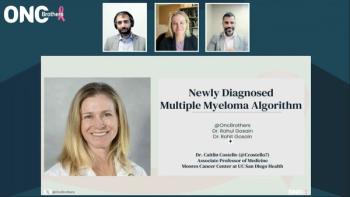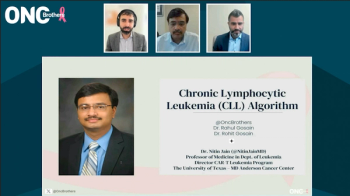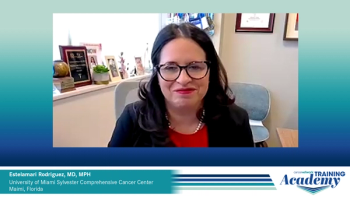
Caitlin Costello, MD, explores the evolving role of biomarkers in the early diagnosis and treatment of multiple myeloma, highlighting their impact on the changing landscape of the disease.

Your AI-Trained Oncology Knowledge Connection!


Caitlin Costello, MD, explores the evolving role of biomarkers in the early diagnosis and treatment of multiple myeloma, highlighting their impact on the changing landscape of the disease.

Focusing on the MARIPOSA trial, the panel provides thoughts the potential role of amivantamab and lazertinib, and discusses treatment decisions upon progression.

Medical oncologists review the FLAURA2 study looking at osimertinib with or without chemotherapy in EGFR-mutated NSCLC and discuss patients for whom they would consider the therapy.

Collaboration among nurses, social workers, and others may help in safely administering outpatient bispecific T-cell engager therapy to patients.

Immunotherapy may be an “elegant” method of managing colorectal cancer, says Gregory Charak, MD.

D. Ross Camidge, MD, PhD, spoke about how the approval of alectinib is the beginning of multiple other approvals for patients with ALK-positive NSCLC.

Nurses should be educated on cranial nerve impairment that may affect those with multiple myeloma who receive cilta-cel, says Leslie Bennett, MSN, RN.

Alexander Spira, MD, PhD, FACP, presents a case of a 45-year-old male with stage IV NSCLC, bone and liver metastases, and an EGFR exon 20 insertion; the panel then discusses their approach to treating brain metastases using stereotactic radiosurgery radiation therapy.

The panelists explore the importance of communicating with patients, nurses, and caregivers about potential adverse reactions and injection site reactions, while emphasizing the need to offer ongoing reassurance and support throughout the treatment journey.

Treatment with cilta-cel may give patients with multiple myeloma “more time,” according to Ishmael Applewhite, BSN, RN-BC, OCN.

Nurses may need to help patients with multiple myeloma adjust to walking differently in the event of peripheral neuropathy following cilta-cel.

Nitin Jain, MD, discusses a novel treatment approach for chronic lymphocytic leukemia, along with stem cell transplantation and other later-line therapies and treatment options for managing CLL.

Nitin Jain, MD, discusses the increasing use of various Bruton's tyrosine kinase inhibitors as front-line treatment options for patients with chronic lymphocytic leukemia.

Nitin Jain, MD, presents data on the efficacy of various chronic lymphocytic leukemia treatments, reviews current guidelines, discusses the increasing use of Bruton's tyrosine kinase inhibitors and the decreasing role of chemotherapy in his practice. He emphasizes the importance of considering patient factors and preferences in treatment decision-making.

Medical professionals discuss factors influencing the decision between observation and treatment, optimal diagnostic methods for chronic lymphocytic leukemia (CLL), and key markers to assess in patients with suspected CLL.

Administering neoadjuvant therapy to patients with colorectal cancer may help surgical oncologists attain a negative-margin resection.

An overview of frontline treatment options for patients with EGFR-mutated non–small cell lung cancer.

Expert perspectives on next-generation sequencing for patients with non–small cell lung cancer, highlighting challenges and the differences between RNA and DNA testing.

Christine Bestvina, MD, presents her treatment strategy for a 62-year-old female with NSCLC, bone and liver metastases, and an EGFR exon 20 insertion; the panel then assesses clinical data, including the MARIPOSA trial, to guide their treatment decisions.

Sandip Patel, MD, presents a case study of a 62-year-old female patient with a PD-L1 expression of 60%, an EGFR exon 20 insertion mutation, and liver lesions, followed by a panel discussion on diagnostic strategies to optimize patient care.

Increasing screening for younger individuals who are at risk of colorectal cancer may help mitigate the rising early incidence of this disease.

Laparoscopy may reduce the degree of pain or length of hospital stay compared with open surgery for patients with colorectal cancer.

Drs Costello and Pianko close their discussion by sharing advice for clinicians administering bispecifics to their patients with relapsed/refractory multiple myeloma.

Experts discuss key data on the outpatient management of teclistamab.

Matthew Pianko, MD, explains how patients with relapsed/refractory multiple myeloma are monitored for CRS and ICANS.

Caitlin Costello, MD, shares her thoughts on administering teclistamab to patients with relapsed/refractory multiple myeloma in an outpatient setting.

Key opinion leaders discuss how bispecifics are administered at their institutions.

Experts review how the treatment landscape for relapsed/refractory multiple myeloma shifted with the addition of bispecifics, and the currently approved bispecifics available.

Sam Klempner, MD, provides insight on HER2-targeted therapy for patients with upper GI cancer, and the Oncology Brothers recap the entire discussion.

Medical oncologists discuss the role for comprehensive next-generation sequencing (NGS) in upper GI cancers and the potential role for zolbetuximab.